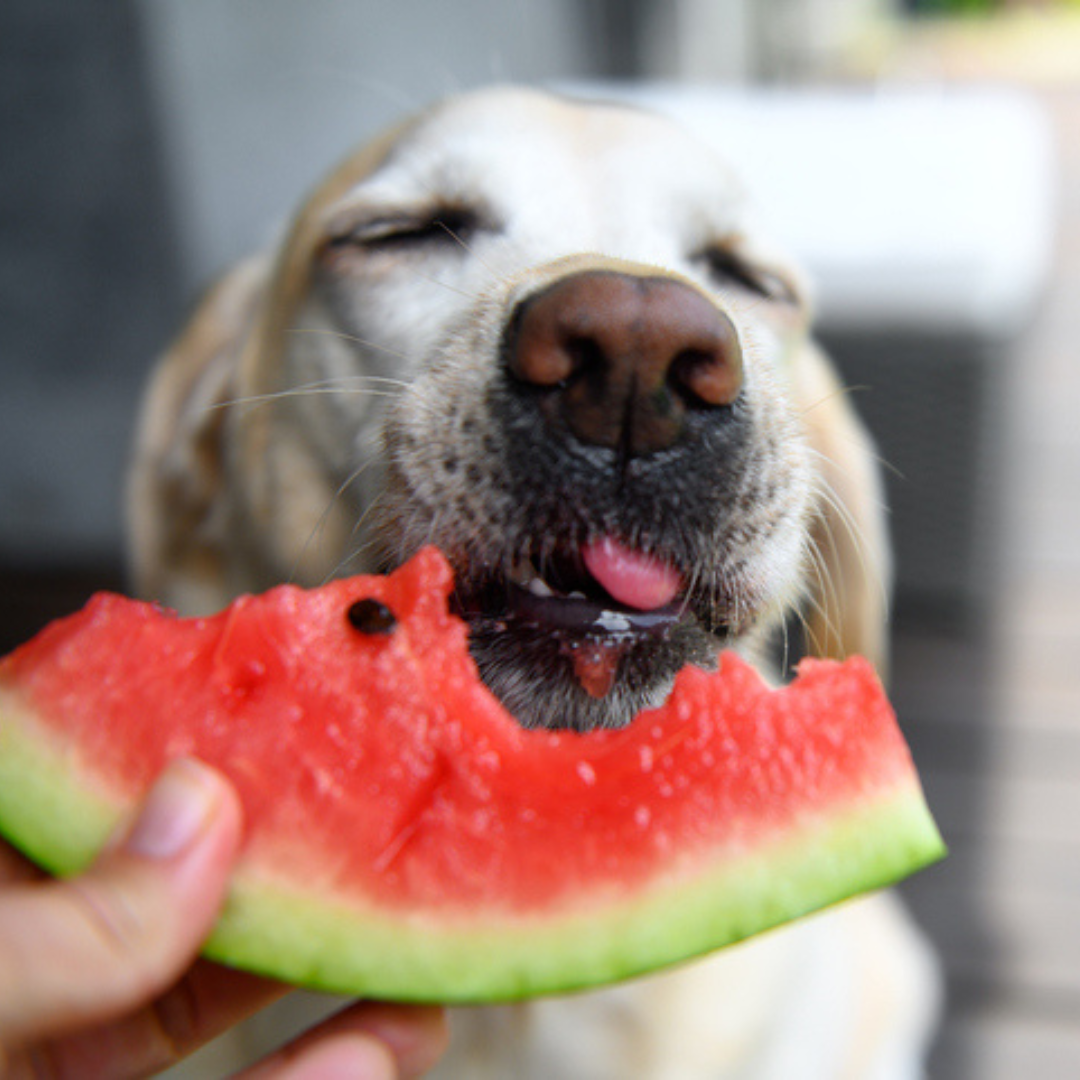Can dogs eat chia?
Highlights of the Chia Seeds Blog for Dogs
-
Learn what chia seeds are
-
Understanding the nutritional value of chia seeds for dogs
-
A guide on how to feed chia seeds to your dog
-
Recommendations, tips, and alternatives
-
Quick and easy recipes
Can Dogs Eat Chia Seeds?
Chia seeds, the tiny yet mighty superfood, have become popular amongst health enthusiasts for their nutritional benefits. But as dog parents, we often wonder if what's good for us is also good for our dogs. This curiosity brings us to the question: Can dogs enjoy the benefits of chia seeds just as we do? In this blog post, we'll dive into the world of chia seeds and their compatibility with dogs, covering everything from the basic considerations to specific dietary implications.
What are Chia Seeds?
Chia seeds are packed with nutrients including fiber, protein, omega-3 fatty acids, and essential vitamins and minerals. When soaked, they develop a gel-like texture due to their soluble fiber content, making them ideal for thickening recipes such as puddings and smoothies. Renowned for aiding digestion, promoting heart health, and providing sustained energy, chia seeds have become a popular superfood in modern diets, easily incorporated into various dishes ranging from breakfast cereals and yogurt to salads and baked goods.
Chia Seeds and Dogs
Chia seeds or super-seeds, have significant nutritional benefits and are safe for pups. These seeds are packed with essential nutrients beneficial for dogs, including omega-3 fatty acids, antioxidants, and fiber. These can help your dog's overall health, from skin & coat to heart health. Introducing chia seeds to a dog's diet should be done in moderation and prepared properly. The way chia seeds are prepared and served can significantly impact their digestibility. Read on to learn the best way to prepare and serving sizes.
Benefits of Chia Seeds for Dogs
Yes! Chia seeds or super-seeds, have significant nutritional benefits and are safe for canine consumption. These seeds are packed with essential nutrients beneficial for dogs, including omega-3 fatty acids, antioxidants, and fiber. These nutrients can help with health, from coat condition to heart health. An animal study even showed long-term intake of chia seeds led to increased bone minerals (Source National Library of Medicine).
Importantly, introducing chia seeds to a dog's diet should be approached with care to ensure they are digested properly and to prevent any potential dietary discomfort. It is vital to note that while these seeds are non-toxic and generally safe for dogs, the manner in which they are prepared and served can significantly impact their suitability and effectiveness as a dietary supplement for pets. As such, understanding the proper preparation methods and serving sizes becomes crucial in leveraging the nutritional benefits chia seeds offer to our dogs without risking adverse effects.
How Much Should I Be Feeding?
How much is too much when incorporating chia seeds into your dog's meals? A common guideline we recommend you follow is to use 1/4 teaspoon of chia seeds per 10 pounds of body weight. This measurement helps ensure that your dog gets the nutritional boost without overwhelming their system. For example, a 30-pound dog would typically receive 3/4 teaspoon of chia seeds per day. See the table below to find out the right amount for your pup!

Chia Seed Recipes for Dogs
Essential Nutrient Mix for Dogs
When you’re home cooking for your dog is important to balance your dog’s meals. You want to ensure they are getting all the nutrients they require to thrive and be healthy. Our Essential Nutrient Mix was developed by vets and nutritionists to ensure your dog is getting the optimal vitamins and minerals when home cooking. Our Essential Nutrient Mix includes prebiotics, calcium, omegas and more. Use alongside our nutritionist developed recipes to make complete and balanced meals, or use with your own home cooking.
Get your dog our Essential Nutrient Mix today.

How to Prepare Chia Seeds for Dogs
When incorporating chia seeds or organic chia seeds into your dog's diet, moderation and proper preparation are key. Begin by soaking a small quantity of seeds in plenty of water, aiming for a ratio of about 1 part chia seeds to 10 parts water. This should be left to sit for approximately 15-20 minutes, or until the seeds have fully absorbed the water and transformed into a gel-like substance. This soaking process is crucial as it aids in making the seeds more digestible for your dog and helps in preventing potential choking hazards or intestinal blockages. Once the chia seeds have reached this gel state, you can mix them directly into your dog’s regular meals. For initial servings, aim for a small teaspoon of the chia gel mixed with their food to gauge their reaction. Remember, the key to introducing new foods is in starting small & gradually increasing to allow your dog's digestive system to adjust without causing discomfort or adverse reactions.
Can Dogs Eat Chia Pudding?
When considering chia pudding for dogs, it's essential to focus on the ingredients beyond just chia seeds. Chia pudding made for human consumption often includes additives and sweeteners that are not suitable for dogs. Therefore, if you're thinking about offering chia pudding to your dog, it should be kept as simple as possible. This means avoiding any artificial sweeteners, chocolate, or any other ingredients that could potentially harm your dog. A basic chia pudding prepared with chia seeds and water, without any added sugars or flavours, can be a special treat for your dog. However, it's crucial to serve it in moderation to prevent any digestive issues that might arise from introducing a new food item. Remember to observe your dog for any signs of digestive discomfort or allergies after trying new foods, including chia pudding.
Can Dogs Eat Chia Seeds Everyday?
Incorporating chia seeds into your dog's diet can be beneficial, yet it's important to balance their intake. Given the rich fiber content of chia seeds, it's advisable to integrate these seeds into your dog's meals in small doses. A gradual approach allows you to closely monitor your dog’s reaction to this new food addition. Although chia seeds are packed with nutrients, offering them as part of your dog's daily diet in moderate amounts is key to avoiding any potential gastrointestinal issues. Ideally, introducing chia seeds a few times a week initially will help in assessing how well your dog tolerates this supplement. To start, try making these seed crackers! If you're looking for other sees that you can feed your dog, check out our blog post Why you Should Add Seeds to Your Dog's Diet.
Will Chia Seeds Help with Constipation?
Chia seeds are known for their high soluble fiber content, which makes them a natural remedy for constipation in dogs. This type of fiber absorbs water, which not only helps in forming a softer stool but also promotes a smoother bowel movement. For dogs experiencing constipation, incorporating a small amount of prepared chia seed gel into their diet can provide significant relief. The water-absorbing properties of chia seeds mean that they expand in the intestines, aiding in the easier passage of stool. However, it's crucial to accompany this dietary adjustment with an increase in your dog's water intake. Adequate hydration plays an essential role in maximizing the effectiveness of fiber, ensuring that the digestive system functions optimally.
FAQs
Can Dogs Eat Hemp Hearts?
Hemp hearts, also known as hemp seeds, are safe for dogs to eat in moderation and can provide various health benefits. Hemp hearts are rich in protein, omega-3 and omega-6 fatty acids, fiber, vitamins, and minerals, making them a nutritious addition to a dog's diet.
Can Dogs Eat Flaxseeds?
While small amounts of ground flaxseeds are generally safe for dogs to consume, it's essential to do so in moderation as you should with all seeds. Flaxseeds contain omega-3 fatty acids, which can be beneficial for a dog's coat and skin health, as well as fiber, which can aid digestion. However, flaxseeds are also high in fat, so excessive consumption can lead to digestive upset or even pancreatitis in some cases. Want to learn more about which seeds your dog should be eating? Find out here! To start introducing your dog to seeds, try making these seed crackers !
Can Dogs Eat Blueberries?
Yes, dogs can eat blueberries, and they are often considered a healthy treat for them. Blueberries are low in calories and contain various vitamins, minerals, and antioxidants that can be beneficial for dogs. They are particularly rich in vitamin C, fiber, and phytochemicals that may help support a dog's immune system and overall health. Here is a Blueberry Chia Recipe to get you started!
Can Chia Seeds Help in Reducing Dogs Body Weight?
Chia seeds can potentially be beneficial for dogs in moderation, but they are not specifically designed or proven to help with weight loss in a dog's body. While chia seeds are high in fiber and can help promote a feeling of fullness, leading to potentially reduced calorie intake, there isn't substantial evidence to suggest that they are effective for decreasing obesity in dogs.
Do Chia Seeds Have Gluten?Weight?
Chia seeds are naturally gluten-free, making them a suitable option for individuals who need to avoid gluten in their diet due to celiac disease, gluten sensitivity, or other reasons. Gluten is a protein found in grains such as wheat, barley, and rye, but chia seeds come from a different plant entirely, Salvia hispanica, and do not contain gluten.
Does Chia Seeds Have Omega Fatty Acids?
Yes, chia seeds are an excellent source of omega-3 fatty acids, specifically alpha-linolenic acid (ALA). Omega-3 fatty acids are considered essential fatty acids, meaning that the body cannot produce them on its own and must obtain them from dietary sources.
Can Chia Seeds Regulate a Dog's Blood Sugar Level?
Chia seeds may have some potential benefits for helping to regulate a dog's blood sugar levels due to their high fiber content and low glycemic index. The soluble fiber in chia seeds can help slow down the absorption of sugar into the bloodstream, which may contribute to more stable blood sugar levels after meals.







